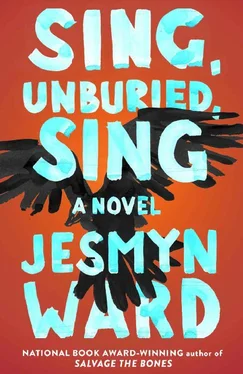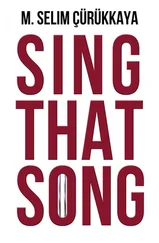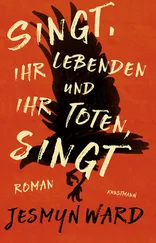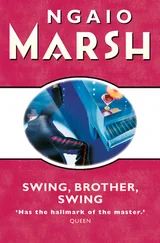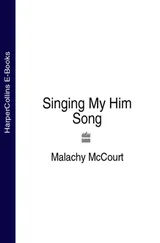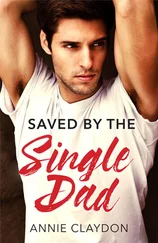“Nice meeting y’all,” I say, and it sounds high-pitched and ridiculous coming out of my mouth, with the men still tussling and Maggie still whacking. Big Joseph’s on top now, choking Michael, and even though I want to go back and help Michael, I don’t. I open the door and pull Jojo and Michaela. I take one look back and see Michael punch his daddy in the throat. Then we’re out the door, and the sky in the Kill is wide and open and cold, awash in stars, and we down the porch steps, standing by the car, shivering, listening to the banging in the house. A crash, and a light goes out.
“Get in,” I say, and Jojo climbs in the backseat with Michaela.
“Shit,” Michaela lisps, and it sounds like thit .
“Don’t say that,” I say. We sit in the car in the dark with the first of the crickets and katydids that come alive in the warmer months and listen to them trill, protesting the frigid air, the unfeeling stars, and we wait.
* * *
It’s minutes. Or it’s hours. Could be days, too, and maybe we slept through the sunrise and sunset, and woke to the night, again and again, and them still rolling and breaking things inside. Daddy and son. Until Michael and his mama come out the door, Michael kicking right through the screen, Maggie rushing out behind him to grab his shoulders. To turn him to her. To yell at him, then talk to him, then murmur. Michael leans down toward his mother in breaths until he’s hunched over her, his head on her shoulder, her rubbing his back like a baby. Her robe turning black where he brushes against it: blood dabbed from his touch. Michael sobbing then. The bugs quiet.
“We should’ve left,” Jojo whispers.
“Shut up,” I say.
“Kayla’s still hungry,” Jojo says.
I should leave. I should leave him to his family. Take my daughter home and feed her, fill her stomach, quiet her whimpering. But I don’t. I can’t. Maggie pulls the door open, disappears inside, and I expect Michael to walk toward the car but he doesn’t. He just leans over and crosses his arms and puts them on the porch railing and hunches over, waiting. His mother opens the door again and almost hits him, and then she’s passing him a paper grocery bag and hugging him to her and talking to him again, and with each word, she thumps his back with the flat of her hand. And he’s a baby again, and it looks like she’s trying to burp him. I look down at my lap. Out the driver’s side window. Off into the far line of the woods. There’s the sound of a door slamming shut, and then a creak, and Michael’s opening the car and sliding into the passenger seat. The bugs loud and then dim again. The bag crackles.
“Are you okay?” I ask. I know it’s stupid, but still, this is what I say.
“Let’s go,” Michael says.
The car chokes and cranks to life. I drive slowly down the driveway, swerving around muddy potholes, the bugs scatting our way. When I turn onto the street, the house is all dark. All the windows dim: the siding and beams and glass of the front of it smooth and still as a blank face.
* * *
Pop is home when I turn into the gravel drive. He’s sitting on the porch, still as the swing and the potted plants at both sides of the door; he’s cut the light off so he is a darkness in the darkness, and the only reason I know it’s him is by the way he flicks his lighter to life and then releases it, lets it flutter, and then he flicks again. He smoked when I was younger. Packed and rolled the cigarettes himself. But after he caught me around the back of the shed lighting one of his spent cigarettes with only a fingernail’s worth of tobacco in it, he slapped it and the match out of my hand, and I never saw nor smelled the scent of one on him again. The way he looked at me when the cigarette hit the ground. Eyes wide, disappointed: pained. It was the first time I remember Pop looking at me like that. I was eleven and my breasts were budding and my friends at school were already smoking weed and worse, so I wanted to try at least a cigarette, but recalling his face, the way he looked guilty and angry at the same time, made me wish I’d never picked up that bud of rolled tobacco, never stole that match, never lit it, never hid back there for Pop to catch me.
So now whenever Pop is thinking about something but doesn’t want to let anyone know he’s thinking about something, worrying it over, he does this. Light, gutter, light, gutter. Where I was the one hesitant in the Kill, now it’s Michael that stands at my elbow, slumped, curled in on himself: like I got a cur dog on a short, frayed leash. He tries to grab Michaela out of the car, but by the time he gets around to her side, Jojo is out and Michaela is patting his face, saying eat-eat with every little tap, and they are already walking toward Pop in the darkness. Michael and I grab bags, so by the time we get up the porch steps, Michaela is disentangling herself from Pop’s arms, and Jojo is carrying her into the house. Here, Pop is a dusky smudge, the tattoos on his arms lit up in a flash with the lighter, and then out again. When I was younger, I would sneak and stand next to him when he took a nap on the couch, smell his breath, the way it smelled of tobacco and mint and musk, and I would trace over his tattoos with my pointer finger, without touching him, just follow the illustrations around: a ship; a woman who looked like Mama, clothed in clouds and carrying arrows and a pine branch in her hand; and two cranes: one for me, and one for Given. Given’s is alight, poised in flight, feet skimming the marsh grass, while mine is beak down in the mud. When I was five, Pop pointed at mine and told me: This the one I got for you: they a sign of luck when you see them, mean everything is in balance, that it’s raining good and there’s fish and there’s things squirming under the marsh mud, that the bayou grass going to be green soon. They a sign of life. The light gutters, and they are erased in the dark. Pop speaks and I see his teeth.
“Your mama been asking about you.”
“Sir,” Michael says. I feel the words as much as I hear them; hot puff of air that caresses my shoulder.
“Michael,” Pop says. He clears his throat. “I expect it’s good to be home.”
“Yes, sir.”
“Your mama—” Pop’s voice breaks off.
“We getting a place,” Michael interrupts. “Soon.”
Pop lights and his face flashes. He is frowning, and then the flame dies.
The night is country dark.
“It’ll keep until tomorrow.” Pop rises. “Leonie, go on and see your mother.”
* * *
Mama is laying in the bed with her face turned to the wall, and her chest is still, the bones from the spoon of her clavicle close and hard under the skin: a rusted cooking grate over a busted barbecue pit. Her arms are all bone, the skin and thin muscle overlaying them sliding to bunch at odd places: too far away from the elbow, too near the center of her throat. She swallows, and I feel relief wash through me, and I realize I was watching to see if she was breathing, to see if she was moving, to see if she was still here. It’s like a quick rain over hot, dry earth.
“Mama?”
Her head moves an inch, and then one more, and then she’s looking at me, her eyes too alive in her face. The pain glistens in her black irises, moves like smoke over the whites. The only thing bright while the rest of her dulls.
“Water?” she asks. It’s a scratchy whisper, hardly there in the din of the night insects trilling through the open window.
I lift the cup and straw Pop left next to the bed for her to drink. I should have been here.
“Michael’s home,” I say.
She tongues the straw out of her mouth and swallows. Lays her head back. Her hands curled on the thin white blanket like an invalid’s.
Читать дальше
